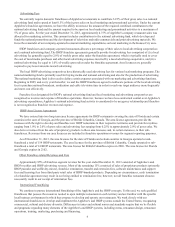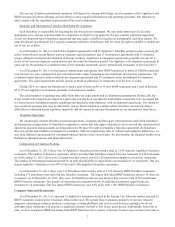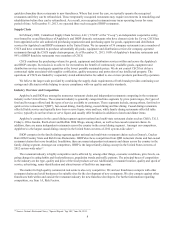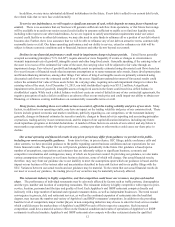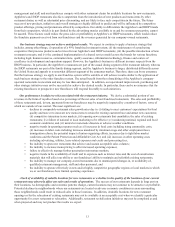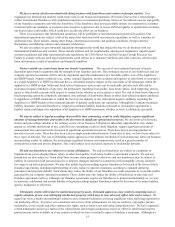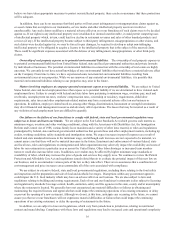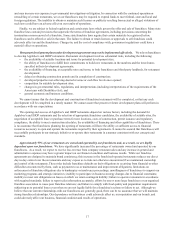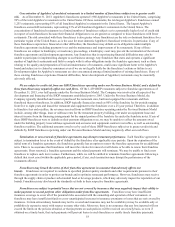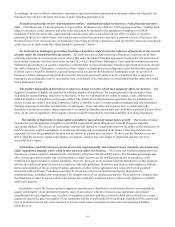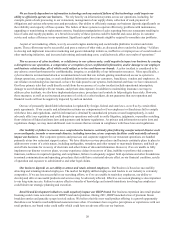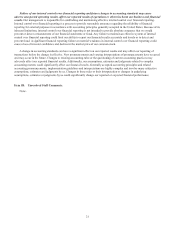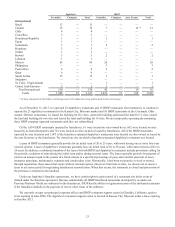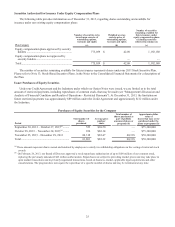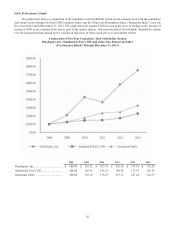IHOP 2013 Annual Report Download - page 37
Download and view the complete annual report
Please find page 37 of the 2013 IHOP annual report below. You can navigate through the pages in the report by either clicking on the pages listed below, or by using the keyword search tool below to find specific information within the annual report.16
believe we have taken appropriate measures to protect our intellectual property, there can be no assurance that these protections
will be adequate.
In addition, there can be no assurance that third parties will not assert infringement or misappropriation claims against us,
or assert claims that our rights in our trademarks, service marks and other intellectual property assets are invalid or
unenforceable. Any such claims could have a material adverse effect on us or our franchisees if such claims were to be decided
against us. If our rights in any intellectual property were invalidated or deemed unenforceable, it could permit competing uses
of intellectual property which, in turn, could lead to a decline in restaurant revenues and sales of other branded products and
services (if any). If the intellectual property became subject to third-party infringement, misappropriation or other claims, and
such claims were decided against us, we may be forced to pay damages, be required to develop or adopt non-infringing
intellectual property or be obligated to acquire a license to the intellectual property that is the subject of the asserted claim.
There could be significant expenses associated with the defense of any infringement, misappropriation, or other third-party
claims.
Ownership of real property exposes us to potential environmental liabilities. The ownership of real property exposes us
to potential environmental liabilities from United States federal, state and local governmental authorities and private lawsuits
by individuals or businesses. The potential environmental liabilities in connection with the ownership of real estate are highly
uncertain. We currently do not have actual knowledge of any environmental liabilities that would have a material adverse effect
on the Company. From time to time, we have experienced some non-material environmental liabilities resulting from
environmental issues at our properties. While we are unaware of any material environmental liabilities, it is possible that
material environmental liabilities relating to our properties may arise in the future.
Matters involving employees at company-operated restaurants expose us to potential liability. We are subject to United
States federal, state and local employment laws that expose us to potential liability if we are determined to have violated such
employment laws. Failure to comply with federal and state labor laws pertaining to minimum wage, overtime pay, meal and
rest breaks, unemployment tax rates, workers' compensation rates, citizenship or residency requirements, child labor
requirements, sales taxes and other employment-related matters may have a material adverse effect on our business or
operations. In addition, employee claims based on, among other things, discrimination, harassment or wrongful termination
may divert financial and management resources and adversely affect operations. The losses that may be incurred as a result of
any violation of such employment laws are difficult to quantify.
Our failure or the failure of our franchisees to comply with federal, state and local governmental regulations may
subject us to losses and harm our brands. We are subject to the Fair Labor Standards Act (which governs such matters as
minimum wages, overtime and other working conditions), along with the Americans with Disabilities Act, the Immigration
Reform and Control Act of 1986, various family leave mandates and a variety of other laws enacted, or rules and regulations
promulgated by federal, state and local governmental authorities that govern these and other employment matters, including tip
credits, working conditions, safety standards and immigration status. We expect increases in payroll expenses as a result of
federal and state mandated increases in the minimum wage, and although such increases are not expected to be material, we
cannot assure you that there will not be material increases in the future. Enactment and enforcement of various federal, state
and local laws, rules and regulations on immigration and labor organizations may adversely impact the availability and costs of
labor for our restaurants in a particular area or across the United States. Other labor shortages or increased team member
turnover could also increase labor costs. In addition, our vendors may be affected by higher minimum wage standards or
availability of labor, which may increase the price of goods and services they supply to us. We continue to review the Patient
Protection and Affordable Care Act and regulations issued related thereto to evaluate the potential impact of this new law on
our business, and to accommodate various parts of the law as they take effect. There are no assurances that a combination of
cost management and price increases can accommodate all of the costs associated with compliance.
We are subject to extensive federal, state and local governmental regulations, including those relating to the food safety
and inspection and the preparation and sale of food and alcoholic beverages. Disruptions within any government agencies
could impact the U.S. food industry which may have an adverse affect on our business. We are also subject to laws and
regulations relating to building and zoning requirements. Each of our and our franchisees' restaurants is also subject to licensing
and regulation by alcoholic beverage control, health, sanitation, safety and fire agencies in the state, county and/or municipality
where the restaurant is located. We generally have not encountered any material difficulties or failures in obtaining and
maintaining the required licenses and approvals that could impact the continuing operations of an existing restaurant, or delay
or prevent the opening of a new restaurant. Although we do not, at this time, anticipate any occurring in the future, we cannot
assure you that we or our franchisees will not experience material difficulties or failures that could impact the continuing
operations of an existing restaurant, or delay the opening of restaurants in the future.
In addition, we are subject to laws and regulations, which vary from jurisdiction to jurisdiction, relating to nutritional
content and menu labeling. Compliance with these laws and regulations may lead to increased costs and operational complexity


